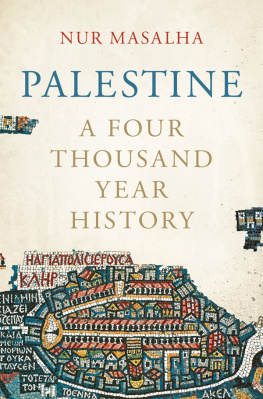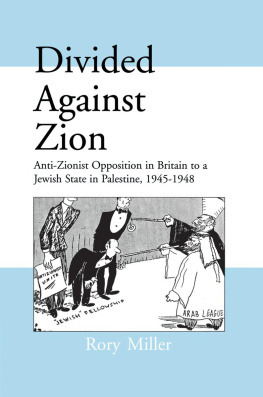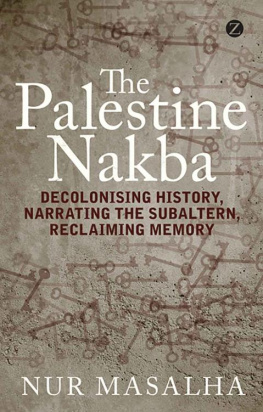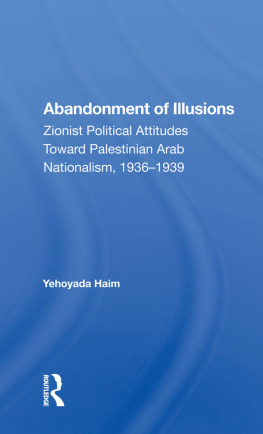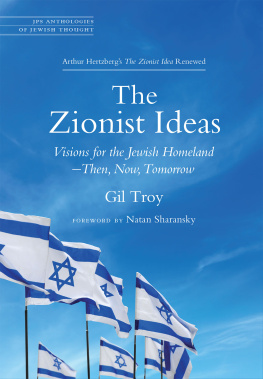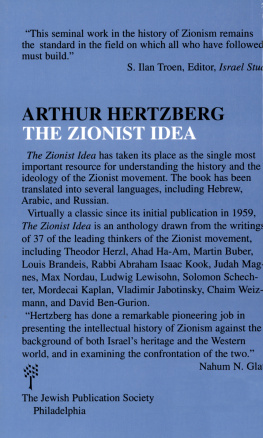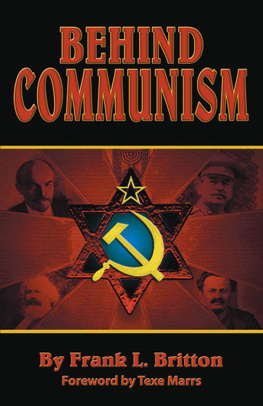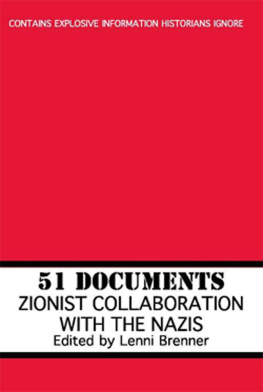Masalha - The Zionist Bible (BibleWorld)
Here you can read online Masalha - The Zionist Bible (BibleWorld) full text of the book (entire story) in english for free. Download pdf and epub, get meaning, cover and reviews about this ebook. year: 2014, publisher: Taylor and Francis, genre: Home and family. Description of the work, (preface) as well as reviews are available. Best literature library LitArk.com created for fans of good reading and offers a wide selection of genres:
Romance novel
Science fiction
Adventure
Detective
Science
History
Home and family
Prose
Art
Politics
Computer
Non-fiction
Religion
Business
Children
Humor
Choose a favorite category and find really read worthwhile books. Enjoy immersion in the world of imagination, feel the emotions of the characters or learn something new for yourself, make an fascinating discovery.

- Book:The Zionist Bible (BibleWorld)
- Author:
- Publisher:Taylor and Francis
- Genre:
- Year:2014
- Rating:5 / 5
- Favourites:Add to favourites
- Your mark:
- 100
- 1
- 2
- 3
- 4
- 5
The Zionist Bible (BibleWorld): summary, description and annotation
We offer to read an annotation, description, summary or preface (depends on what the author of the book "The Zionist Bible (BibleWorld)" wrote himself). If you haven't found the necessary information about the book — write in the comments, we will try to find it.
Masalha: author's other books
Who wrote The Zionist Bible (BibleWorld)? Find out the surname, the name of the author of the book and a list of all author's works by series.
The Zionist Bible (BibleWorld) — read online for free the complete book (whole text) full work
Below is the text of the book, divided by pages. System saving the place of the last page read, allows you to conveniently read the book "The Zionist Bible (BibleWorld)" online for free, without having to search again every time where you left off. Put a bookmark, and you can go to the page where you finished reading at any time.
Font size:
Interval:
Bookmark:

THE ZIONIST BIBLE
BibleWorld
Series Editors: Philip R. Davies and James G. Crossley, University of Sheffield
BibleWorld shares the fruits of modern (and postmodern) biblical scholarship not only among practitioners and students, but also with anyone interested in what academic study of the Bible means in the twenty-first century. It explores our ever-increasing knowledge and understanding of the social world that produced the biblical texts, but also analyses aspects of the Bibles role in the history of our civilization and the many perspectives not just religious and theological, but also cultural, political and aesthetic which drive modern biblical scholarship.
The Zionist Bible
Biblical Precedent, Colonialism and the Erasure of Memory
Nur Masalha

First published 2013 by Acumen
Published 2014 by Routledge
2 Park Square, Milton Park, Abingdon, Oxon OX14 4RN
711 Third Avenue, New York, NY 10017
Routledge is an imprint of the Taylor & Francis Group, an informa business
Nur Masalha, 2013
This book is copyright under the Berne Convention.
No reproduction without permission.
All rights reserved. No part of this book may be reprinted or reproduced or utilised in any form or by any electronic, mechanical, or other means, now known or hereafter invented, including photocopying and recording, or in any information storage or retrieval system, without permission in writing from the publishers.
Notices
Practitioners and researchers must always rely on their own experience and knowledge in evaluating and using any information, methods, compounds, or experiments described herein. In using such information or methods they should be mindful of their own safety and the safety of others, including parties for whom they have a professional responsibility.
To the fullest extent of the law, neither the Publisher nor the authors, contributors, or editors, assume any liability for any injury and/or damage to persons or property as a matter of products liability, negligence or otherwise, or from any use or operation of any methods, products, instructions, or ideas contained in the material herein.
ISBN : 978-1-84465-657-8 (hardcover)
British Library Cataloguing-in-Publication Data
A catalogue record for this book is available from the British Library.
Designed and typeset in Warnock Pro by JS Typesetting Ltd.
This book could not have been written without the practical help and emotional support of my family and friends. Many friends and colleagues have contributed to and shaped this project, directly and indirectly, with ideas, conversations, criticism, material, logistics and moral support, including four extraordinary individuals who are no longer with us: Israel Shahak, Edward Said, Michael Prior and Samih Farsoun. I am also particularly grateful to the following colleagues: Thomas Thompson, Ahmad Sadi, Ilan Pappe, Oren Ben-Dor, Ronit Lentin, Haim Bresheeth, Mary Grey, John Docker, Duncan Macpherson, Samuel Kuruvilla, Isabelle Humphies, Anthony Towey, Tarcisius Mukuka and Saad Chedid. I am particularly indebted for the encouragement and practical support of Professor Philip R. Davies. Last but not least, I owe enormous gratitude to my wife Dr Stephanie Cronin, of Oxford University, and my daughter Maryam Masalha, for their tremendous support. Any credit for this book should be shared with the people above, but all mistakes are mine alone.
The secular founding fathers of Jewish Zionism sought to underpin the legitimacy of their European movement in the biblical text. Testifying before the British Royal (Peel) Commission in 1936, David Ben-Gurion, then head of the Jewish Agency, declared The Bible is our mandate. For Ben-Gurion, the Tanakh, , the land traditions and narratives of the Hebrew Bible, reconfigured and reinvented in the last century as a foundational metanarrative of Zionism and the State of Israel, have been instrumental in the ethnic cleansing of Palestine. Today the same land traditions continue to be at the heart of the displacement and dispossession of Palestinians (both Muslims and Christians) from Jerusalem.
The Bible as a whole (both Old and New Testaments) is also the first text of the West and central to the Judeo-Christian tradition and, as such, it has been (and remains) central to Western support for the State of Israel. Since the late nineteenth century political Zionism (and todays Israel lobby) has continued to enjoy an extraordinary influence in the corridors of power of the West. For a variety of reasons (which include epistemology and politics of the biblical text), the Israeli state has been central to Western policies in the oil-rich Middle East. In addition to its geopolitical-strategic value and its immense military and nuclear capabilities, the Israeli state has had enormous significance for post-Second World War Western politics. In the post-Holocaust period the massive financial, military and political support for the Jewish State in Palestine has also been seen as an opportunity to redeem Europe (and the West) from the genocidal crimes of Nazism.
In her book Bible and Sword: How the British came to Palestine (1956, 1982) Barbara Tuchman shows how the two magnets, the Bible and the sword, have drawn countless British pilgrims, crusaders, missionaries, archaeologists and conquerors and ultimately led to the British conquest of Palestine in 1918. Central to this book is the idea that the land conquest narrative of the Bible has been the key text that redeems the European settler-colonization of Palestine. Outside the Middle East the Bible has redeemed European empires and European settler-colonialism, the conquest of the earth, and even current American imperialism. As a fact of power, the authority of the biblical narrative has also been central to organized religion and collective memory. As organized memory, the authority of the Bible became critical to the political theologies of the medieval Latin crusaders, Spanish conquistadors in the struggle for colonial power in Latin America from 1492 until the twentieth century and a whole variety of settler-colonialist projects.
Indeed in modern times a range of Western settler-colonial enterprises have deployed the power politics of the biblical text and its famous land conquest narrative very effectively and with devastating consequences for indigenous peoples. The narrative of Exodus has been widely deployed as a framing narrative for European settler-colonialism and the European mission civilisatrice , while other biblical texts have been appropriated and used to provide moral authority for European exploration in, and settler-colonial conquests of, Africa, Asia, Australia and the Americas (Prior, 1997, 1999).
The chapters that follow explore the politics of the biblical text language, narrative, epics, genres, theologies, paradigms and organized memory and its utilization in the service of a settler-colonialist project and Israeli secular state policies. The book also examines the politics of collective identity-fashioning and the retrospective colonization of the ancient past. It argues that the continuing mobilization of the allegorical narratives of the Hebrew Bible in the service of settler-colonization is central to ongoing collective identity-fashioning in Israel.
Framing and morally examining the authority of biblical text and its misappropriation in Israeli state policies are at the heart to this work. Central to the politics of the Hebrew Bible in Israel is the struggle for the land of Palestine, as well as the use and abuse of the biblical text in underpinning Israeli settler-colonial policies. Today, while post-colonial academic discourses in the West have opted for a wide range of critical approaches to the biblical text and language, in Israel the ethnocratic, mono-culturalist discourses of Zionism focus exclusively on the Hebrew Bible, with almost complete disregard for the New Testament. Being Christian the latter is outside the biblical discourse of Israel. The New Testament is effectively a taboo subject in Israeli Jewish schools, neither taught nor mentioned. Occasionally the New Testament makes headlines in the Israeli press for the wrong reasons: as we shall see in army) publicly and ritualistically burn copies of the New Testament. These incidents are conveniently ignored by the Western media a media often obsessed with Islamic
Font size:
Interval:
Bookmark:
Similar books «The Zionist Bible (BibleWorld)»
Look at similar books to The Zionist Bible (BibleWorld). We have selected literature similar in name and meaning in the hope of providing readers with more options to find new, interesting, not yet read works.
Discussion, reviews of the book The Zionist Bible (BibleWorld) and just readers' own opinions. Leave your comments, write what you think about the work, its meaning or the main characters. Specify what exactly you liked and what you didn't like, and why you think so.

